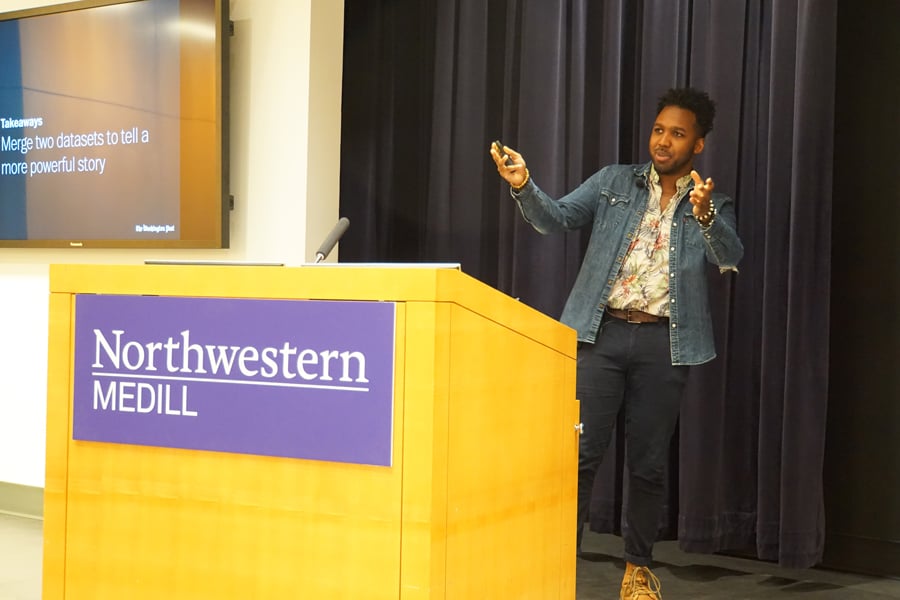Washington Post investigative reporter Aaron Williams speaks about the importance of data visualization
Owen Stidman/Daily Senior Staffer
Washington Post investigative reporter Aaron Williams speaks about his projects and the importance of data visualization.
February 12, 2020
Washington Post investigative reporter Aaron Williams spoke about the importance of data visualization, statistics and journalism at the McCormick Foundation Center Forum Tuesday.
At the Post, Williams is a data reporter, combining the fields of journalism and data science in his work.
During the event, Williams spoke about a few of his projects, including the Washington Post’s “Murder with Impunity” series, a Pulitzer Prize finalist for explanatory reporting in 2019.
In this project, The Post gathered data on homicides in 55 of the country’s biggest cities over the past decade. It found that there are areas with a high number of unsolved cases and how black victims were the least likely of all racial groups to have their killings result in an arrest. The project took two years to complete, as gathering data was very difficult because it wasn’t readily available, Williams said.
“What’s really cool about this (project is that) I think we’ve all been there, whether it’s in your community, where you grew up, where you live now, where you’re like, ‘I see this thing all the time, but I haven’t seen anybody report about it,’” Williams said.
Williams said what took this story to the next step was how his team gathered the data and overlaid it with the murder rate to show who is impacted by unsolved homicides. He also spoke about his projects that examined segregation and the opioid epidemic, where he showed the audience a couple of the visuals displaying data that went along with them.
Through these visuals, Williams demonstrated the importance of graphical representations of data to the audience.
“Data visualization is really important to me because we can not only just see where we’ve been but where we are and ask questions about where we’re going,” Williams said.
Williams’ talk was followed by a Q&A that was moderated by Communication Prof. Nicholas Diakopoulos. He said it was inspiring to have someone operating at such a high level of capability and visibility visit the University to share some of their knowledge and expertise.
“There’s a lot that we can learn from practitioners like Aaron through these types of visits from the industry,” Diakopoulos said.
Medill junior Justine Banbury said she came to this event to learn more about data visualization because there are not many classes offered at Northwestern that teach this skill set.
Banbury said she found the event to be very helpful because she found information on how she can start learning more about the field.
“There’s not a lot of classes or guidance about if you’re interested in this what you should start doing,” Banbury said. “(Williams) gave us some of his work and you can email him and there are some actionable things you can start doing.”
Email: [email protected]
Twitter: @vivianxia7
Related Stories:
– Journalism Prof. Jessica Hullman receives Microsoft Research Faculty Fellowship
– Medill School of Journalism emphasizes 21st century reporting skills












